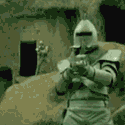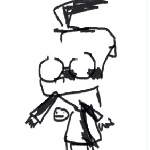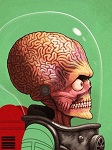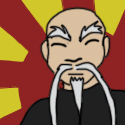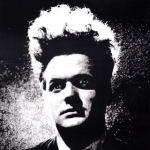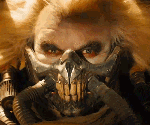|
I think people are getting hung up on the fact that the characters grow to become Capital-E Evil. That's why the final image is Yo-landi with the blackened demon eyes. Ninja sports the vaguely-satanic logo of District 9's mercenaries on both his right arm and his body armor. If the robots in Elysium are presented as a host of angels, then what do you call angels that follow no laws? The basic thesis of the film is that Evil is better than complacency. And this Evil should not be confused with Vincent's too-human motivations. He's just a simple fascist, when Chappie destroys humanity for no better reason than that he wants to. Make no mistake, though: Chappie's creation of the immortals is not dissimilar to the Red Skull's plan of creating a race of supermen in Captain America 1 (although without nuking America, obviously). More accurately, it's the blind destructiveness unleashed in Godzilla 2014, that you cannot resist. As with Elysium, then, the 'personal' reactions people have are actually highly ideological. Walter Chaw's review essentially sides with the Vincent character, and with Pacific Rim. That's bad. SuperMechagodzilla fucked around with this message at 00:57 on Mar 10, 2015 |
|
|
|

|
| # ? Apr 27, 2024 01:26 |
|
Saw this over the weekend, and my feelings are 1) this movie is a mess, 2) I was completely endeared by that. The comparisons to Short Circuit are apt; it's Short Circuit if Ally Sheedy's character was Die Antwoord instead, which is exactly as absurd as it sounds. If anything, I'd rather see a version of this film where Deon didn't exist, and Chappie was some unintended emergent phenomenon (I mean, he's already Johnny 5 in a million other ways, so why not that one, too?) Deon seemed mostly there to provide exposition (as well as a middle-class anchor for the audience), and I could really have done with fewer scenes in a cubicle. Otherwise, this movie was an insane junkyard of half-explored ideas. Vincent is this total bro who designed the ED-209, so it's about militarization of the police, sort of, but also drone warfare because he treats remote violence like a video game. It's also a pseudo-fairytale about parenthood that's really on the nose, and there's a class warfare aspect in there ("people like us need to fight!"), and it's about gender roles and learned masculine violence (Ninja ain't raising no pussy robot.) And on top of all that, the Singularity happens, but it's basically NBD. There are a million ideas at play, and they only sort of gel together. It's madness. But it's really entertaining madness. Which I'd much rather see than some turgid, grey SciFi drama like Transcendence.
|
|
|
|
I didn't really find it all that messy. At least until right after the big action climax. Than the film kind of felt like it was in last minute re-write mode. But it was still really good. I loved the whole God Vs Parents angle the film had. It was pretty unique for a robot movie. That one long post by Ape Agitator is pretty great and I agree with it 100%. Although, my only issue is I'm still not sold on the ending. It seems a little out the left field for me. The film is science fiction, and I'm OKAY with a lot of stuff, but that whole thing kind of rubbed me the wrong way. I thought it was a pipe dream until the film was like "Nope! It's gonna happen!". Still. Good movie. Don't get why everyone is making GBS threads all over it.
|
|
|
|
You were okay with a man coding up consciousness in his house, but your disbelief was stretched by a brain upload?
|
|
|
|
One is a program, the other is...uh...not. Or at least I don't think it is.
|
|
|
|
NecroMonster posted:Die Antwoord. What offended me is the lack of focus. As has been said, its a clusterfuck of different ideas, stated as bluntly as possible, and then not explored at all. I actually would've loved a movie of Die Antwoord just loving around with a robot buddy they're raising for the whole movie, but the movie won't commit to doing that. That's maybe 25 minutes of the runtime, so they get 0 characterization. Then the rest of the time you have Dev Patel popping in and being generally worthless except for shouting random platitudes. And lots of Hugh Jackman staring angrily at things and looking over his shoulder, which is 90% of his screen-time.
|
|
|
bullet3 posted:What offended me is the lack of focus. As has been said, its a clusterfuck of different ideas, stated as bluntly as possible, and then not explored at all. As SMG says, you're confusing setting for plot. Don't.
|
|
|
|
|
CelticPredator posted:Although, my only issue is I'm still not sold on the ending. It seems a little out the left field for me. The film is science fiction, and I'm OKAY with a lot of stuff, but that whole thing kind of rubbed me the wrong way. I thought it was a pipe dream until the film was like "Nope! It's gonna happen!" I get what you mean. It's not so much that it was particularly "unbelievable" in context of the story. It's just given relatively little weight when the idea is a really big one. Chappie's inquiries into the helmet are presented at first as a child-like misunderstanding; he doesn't get that this sensory feedback device isn't capable of copying a person to somewhere else. And they don't really give you a reason to think Deon's naysaying is wrong until Chappie hurriedly explains what he figured out much later. What they could've used was an expanded scene earlier on where Chappie argues more compellingly with Deon; "if consciousness doesn't work that way, how does it work?" "Why is my consciousness not like your consciousness?" Just a minute or two more in screentime could've done a way better job of setting up the premise: maybe it's Deon's perspective that is faulty, maybe Chappie's questioning is less naive than it sounds. More generally, maybe this crazy-sounding plan isn't actually crazy. As it stands, this big-deal thing just sort of happens. And it "makes sense," but feels like an oddly cavalier side note.
|
|
|
|
CelticPredator posted:One is a program, the other is...uh...not. Or at least I don't think it is. I'm not an absolute expert on computation and cognition, but from my time in psychology and my experience with neuroscience, I'm reasonably confident it's going to be much, much easier to move a human brain into a computer simulation than to invent an entire consciousness from scratch. One is just a matter of mapping and modeling. The other requires profound understanding. Human consciousness is a computable process and the brain is almost certainly Turing-compatible. General Battuta fucked around with this message at 02:50 on Mar 10, 2015 |
|
|
|
Is Deon the Old Testament god or the New Testament god? He creates a son to be tortured and die, and is then reborn. But he also gives the son free will and tells him what he can and can't do. I could see an argument either way. I'm beginning to think the movie really is about "the trinity as machines". Deon's death allows him to become like his creation. Rather than god being given flesh like in the Bible, god is given titanium. He is no different than the son. Yolandi's consciousness on the USB is the promise that this is possible for us all. It's the Holy Ghost of the film. Atlas Hugged fucked around with this message at 03:02 on Mar 10, 2015 |
|
|
|
Atlas Hugged posted:Is Deon the Old Testament god or the New Testament god? He creates a son to be tortured and die, and is then reborn. But he also gives the son free will and tells him what he can and can't do. I could see an argument either way. It's a little bit of both with a pinch of gnosticism thrown in for good measure. Deon (The "D." is for "demiurge") is the Maker who tells Chappie that he can do anything he wants, but specifically cautions him against rejecting and unseating the established order. Like SMG points out, there's a really twisted theological logic going on in Chappie. The whole idea of the demiurge is that it exists to distract mankind from the fundamental unity of all life and the cosmos, and he does this for purely selfish reasons: To assert himself as the creator when he himself is 'created' by the greater cosmic order. In the film, rather than the Son being sacrificed to cleanse the sins of humanity, the Maker's body is sacrificed so that his own sins can be forgiven. He accepts that he is not Chappie's controller, but his equal.
|
|
|
|
K. Waste posted:It's a little bit of both with a pinch of gnosticism thrown in for good measure. Deon (The "D." is for "demiurge") is the Maker who tells Chappie that he can do anything he wants, but specifically cautions him against rejecting and unseating the established order. Like SMG points out, there's a really twisted theological logic going on in Chappie. The whole idea of the demiurge is that it exists to distract mankind from the fundamental unity of all life and the cosmos, and he does this for purely selfish reasons: To assert himself as the creator when he himself is 'created' by the greater cosmic order. In the film, rather than the Son being sacrificed to cleanse the sins of humanity, the Maker's body is sacrificed so that his own sins can be forgiven. He accepts that he is not Chappie's controller, but his equal. I can dig this interpretation. See my edit about the trinity, but that sounds right to me.
|
|
|
|
General Battuta posted:I'm not an absolute expert on computation and cognition, but from my time in psychology and my experience with neuroscience, I'm reasonably confident it's going to be much, much easier to move a human brain into a computer simulation than to invent an entire consciousness from scratch. One is just a matter of mapping and modeling. The other requires profound understanding. Hey, fair enough. Like I said, I don't know much about it, so it came out of the blue for me and I didn't really understand it. But it's OK because the movie is good. Maybe a re-watch might fix my issue. Also, what does Hugh Jackman represent? He claims he's religious, but something tells me it's just a surface thing. He doesn't truely believe. He just uses it as a crutch. But I can't really get much evidence for that in the film so that might not be true. He calls Chappie a Godless heathen at one point, which I found interesting.
|
|
|
|
CelticPredator posted:Hey, fair enough. Like I said, I don't know much about it, so it came out of the blue for me and I didn't really understand it. But it's OK because the movie is good. Maybe a re-watch might fix my issue. Maybe Chappie's Godless, in his mind, because he's not being controlled and he thinks for himself? He obviously doesn't have a problem with robots, as long as they're fully under the control of him and do exactly what he says. It's also not a coincidence that when he's in control, the machine becomes a violent murder machine. He's basically Fred Phelps with a mech.
|
|
|
|
Ah, yes. I can see that. He's the believer who uses his beliefs for violence and pain rather than helping anyone. That Moose wasn't going to do anything good for the world. Also, I loved that Chappie didn't kill Jackman in the end. That was nice
|
|
|
|
CelticPredator posted:Ah, yes. I can see that. He's the believer who uses his beliefs for violence and pain rather than helping anyone. That Moose wasn't going to do anything good for the world. Because Chappie is Robo-Jesus. He uses bladed weapons because Jesus says he is the sword. But he also forgives. He brings judgment, but he also brings compassion and forgiveness.
|
|
|
|
"One reason Fukuyama moved from his ‘end-of-history’ theory to a consideration of the new threat posed by the brain sciences is that the biogenetic threat is a much more radical version of the ‘end of history’, one that has the potential to render the free autonomous subject of liberal democracy obsolete. There is a deeper reason, however, for Fukuyama’s turn: the prospect of biogenetic manipulation has forced him, consciously or not, to take note of the dark obverse of his idealised image of liberal democracy. All of a sudden, he has been compelled to confront the prospect of corporations misusing the free market to manipulate people and engage in terrifying medical experiments, of rich people breeding their offspring as an exclusive race with superior mental and physical capacities, thus instigating a new class warfare. It is clear to Fukuyama that the only way to limit this danger is to reassert strong state control of the market and to develop new forms of a democratic political will. While agreeing with all this, I am tempted to add that we need these measures independently of the biogenetic threat, simply in order to control the potential of the global market economy. Maybe the problem is not biogenetics itself, but rather the context of power relations within which it functions. Fukuyama’s arguments are at once too abstract and too concrete. He fails to raise the full philosophical implications of the new mind sciences and technologies, and to locate them in their antagonistic socioeconomic context. What he doesn’t grasp (and what a true Hegelian should have grasped) is the necessary link between the two ends of history, the passage from the one to the other: the liberal-democratic end of history immediately turns into its opposite, since, in the hour of its triumph, it starts to lose its foundation – the liberal-democratic subject. Biogenetic (and, more generally, cognitivist-evolutionary) reductionism should be attacked from a different direction. Bo Dahlbom is right, in his 1993 critique of Daniel Dennett, to insist on the social character of ‘mind’. Theories of mind are obviously conditioned by their historical context: Fredric Jameson recently proposed a reading of Dennett’s Consciousness Explained as an allegory of late capitalism with its motifs of competition, decentralisation etc. Even more important, Dennett himself insists that tools, the externalised ‘intelligence’ on which human beings rely, are an inherent part of human identity: it is meaningless to imagine a human being as a biological entity without the complex network of his/her tools – it would be like imagining a goose without its feathers. But in saying this he opens up a path which should be followed much further. Since, to express it in good old Marxist terms, man is the totality of his/her social relations, Dennett should take the next logical step and analyse this network of social relations. The problem is not how to reduce mind to neuronal activity, or replace the language of mind by that of brain processes, but rather to grasp how mind can emerge only from the network of social relations and material supplements. The real problem is not how, if at all, machines can imitate the human mind, but how the ‘identity’ of the human mind can incorporate machines. [...] Hegel would not have shrunk from the idea of the human genome and biogenetic intervention, preferring ignorance to risk. Instead, he would have rejoiced at the shattering of the old idea that ‘Thou art that,’ as though our notions of human identity had been definitively fixed. Contrary to Habermas, we should take the objectivisation of the genome fully on board. Reducing my being to the genome forces me to traverse the phantasmal stuff of which my ego is made, and only in this way can my subjectivity properly emerge." -Zizek
|
|
|
|
On that note, although Deon believes AI will be vastly more intelligent, the only thing which sets Chappie apart from homo sapiens mentally is quickness in reading. The movie frames both his and Deon's discoveries not as the unique product of genius but as gruntwork, and this gap ends the movie with a bridge over it.
|
|
|
|
|
Effectronica posted:the only thing which sets Chappie apart from homo sapiens mentally is quickness in reading. Um you forgot quickness in painting.
|
|
|
|
It;s kind of hilarious that this movie curbs first from Robocop, then Short Circuit, then finally appears to completely ape the director's own film with the metamorphosis of man into Prawn with the dude's consciousness transferred into a robot. . This wasn't as bad as I thought it would be, pretty entertaining and even though I loving hate Die Antwoord they were not bad as the bonehead thugs. I'd put it way above Elysium, this one should have come out after D9 and closed out the "South African" theme the director had going before moving on to other things. In a lot of ways it's actually kind of a neat callback to certain elements in D9 but I do hope Blomkamp tries some new things in whatever's next (Alien, I guess)
|
|
|
Fiendish Dr. Wu posted:Um you forgot quickness in painting. Well, that's another consequence of his body really. I could duplicate his painting with enough time to work at it, and anyone could. It's that his body is superior in precision and speed that makes us different and allows him to paint well in minutes rather than hours or days. While the film ends by bridging that gap
|
|
|
|
|
Actually, the thing that I think is intriguing about the painting scene and that goes more to Effectronica's point is that it's not really that Chappie has superior speed or mechanical dexterity as a painter. Chappie's painting of the car is achieved neither through (what a child might do) the conceptualization of abstract shapes to organize the content of what one sees ("This is the car, this is the tree, this is the man, this is his hat," etc.), nor does he create a sense of space or depth to make his primary subject (the car) distinct from the background. Rather, what Chappie does is 'scan' the image that appears in front of him and apply varying degrees of pressure onto the brush to 'print' a low resolution image onto the canvas. Now, it's possible that with more time and more colors, Chappie could product a image that had more detail, but ultimately all he can achieve at this infantile, mechanical stage is a rough representation of the contours of the car. Now, this has two possible, over-lapping connotations, as far as I can make out: 1) That Chappie's consciousness, his personage, that which makes him 'more human,' limits him mechanically. 2) That Chappie's essential mechanical nature limits him on a more general, physical level, such that the very way he 'sees' (a wide angle, deep-focus lens hidden somewhere behind his purely aesthetic LCD display, that conveys only compartmentalized and abstracted content rather than depth or complicated details) becomes a kind of handicap that he can never overcome. That is, unless he simply builds himself a new body and transfers his consciousness into that.
|
|
|
|
I was pretty startled to learn that human vision is mostly done in software. Our goo ball eyes collect really lovely, wholly inadequate images, and then a massive neural apparatus in the brain applies a set of evolved rules, a lot of interpolation, and some straight-up guesswork to create what we actually see. Because the environments we look at are quite consistent in their physical traits, this works pretty well, but occasionally you get weird breakdowns like optical illusions. I don't have a point here except that Chappie's camera is probably already better than our eyes as a piece of hardware, but what he can do with that raw information might initially be more limited. Chappie does have two distinct superhuman traits - a superhuman capability to endure violence and a superhuman capability to forgive.
|
|
|
|
The best part is his painting technique is basically impressionism via inkjet.
|
|
|
|
|
It would be interesting to speculate on whether the Scout's weapons recognition software would have/had any effect on Chappie's development, but I think the point of the picture is that he's still too innocent to do anything but paint pictures of what he sees. By the end of the movie, he would be painting very different pictures and have a more sophisticated view of the world- which is a good thing.
|
|
|
|
|
Frankly, and without wanting to stir up poo poo with anyone in particular, I will say not just in particular but in general I'm kind of confused by criticisms that the film 'brings up a lot of ideas that it then goes nowhere with.' My impression of films for as long as I've seen them and for as many as I've seen has been that as soon as an idea is brought up, that becomes a part of the fundamental fabric of the film and how it progresses. These ideas can't be muted, they can either be expanded upon or contradicted. Now, you can make the ideological framing of a film totally explicit - as in, say, The Iron Giant - but that doesn't necessarily make one film good or the other film bad. 'Framing' a story in terms of the explicit addressing of its ideas is just one way of going about it, but in a ramshackle satire like Chappie, it's actually better that these ideas feel more fleeting and episodic because it's appropriate for the setting and characters. If anything, I'd say that the callbacks in Chappie are just made more effective because they're subtly interpolated throughout a narrative of constant action. A particularly good example of this is Ninja ironically teaching Chappie about 'forgiveness.' Ninja essentially only coerces Chappie into forgiving him for literally abandoning him to be attacked by bullies and molested by predators in a van, in order to continue indoctrinating him as a ruthless criminal. Chappie's capacity for complex learning is expressed through this gag reappearing when we least suspect it. Chappie learns to 'forgive,' but, ironically, only after exacting precisely the kind of street justice that Ninja and America taught him. As SMG says, this arc to Chappie as a character is evil, but Blomkamp as the auteur seems to be proposing that this is better than 'complacency.' This is not the film bringing up ideas and going nowhere with them. Rather, the film brings up ideas and then explores them in ways that are deliberately counter-intuitive to Judeo-Christian morality, emphasizing self-sacrifice and passivity. Chappie is never going to carry society's cross for it, as in The Iron Giant. He is never going to forgive us for wrongs until he consciously believes - as opposed to some amnesic state in which he 'forgets his true self' and isn't responsible for his actions - he has exacted justice. This is the exploration of ideas in ways that are disturbing and upset conventional cinematic expectations. There's clearly a Marxist-transhumanist underpinning to this all. Chappie, on the side of the poor brothers and sisters who taught him that there was another way than the facile, bourgeois pursuits of his aspirational creator, does not advocate that his comrades 'prepare themselves' to be given 'new bodies.' Instead, he facilitates the hacking of industrial infrastructure in order to seize the means of control. K. Waste fucked around with this message at 21:18 on Mar 10, 2015 |
|
|
|
I liked the POV shot of Chappie scanning the faces while hiding behind a block of concrete, putting a rectangle around a facelike shape on a bit of wall.
|
|
|
|
Saw this over the weekend. Liked it, but don't think it's very good. Visually it was great, the acting was fine. I loving loved Ninja and Yolandi, and I had no idea who Die Antwoord was before I saw the film. I think Hugh Jackman was completely wasted, as his character was a cartoon villain. Blomkamp is using the same crutch he used in Elysium (which I loved), the arbitrary death time because of technology reasons. There was very little character development in the movie, which has been the case in all of Blomkamp's films. District 9 and Elysium didn't need a lot of character developement because they did a lot thematic and conceptual development, revealing ideas to the viewer. Chappie is a film that absolutely needed good character developement for the title character. There were some good moment, but overall it just felt like they ramped up the amount of Sharlto Copley that shined through as the movie progressed. Chappie never really has a concept of his actions and their consequences until the very end. I think that was a missed opportunity. Someone earlier in this thread compared to Blomkamp to Shyamalan, and I think there's a real danger of his career taking a similar turn. I think Blomkamp is a great directer, I'm going to every movie he ever makes. But he need to stop writing his own scripts. His writing ability is the biggest thing holding him back. It also wouldn't hurt for him to do a project without Sharlto Copley in a lead role. As someone who liked Elysium, I think Chappie is Blomkamp's weakest film. It's definitely a fun movie, probably his most family friendly. While what ended up happening was thematically appropriate, I really wanted Chappie to cap Hugh Jackman, while holding his gun sideways. Gangsta Chappie is the most entertaining aspect of the film. edit: GoldenGun posted:I liked the POV shot of Chappie scanning the faces while hiding behind a block of concrete, putting a rectangle around a facelike shape on a bit of wall.
|
|
|
|
K. Waste posted:Frankly, and without wanting to stir up poo poo with anyone in particular, I will say not just in particular but in general I'm kind of confused by criticisms that the film 'brings up a lot of ideas that it then goes nowhere with.' My impression of films for as long as I've seen them and for as many as I've seen has been that as soon as an idea is brought up, that becomes a part of the fundamental fabric of the film and how it progresses. These ideas can't be muted, they can either be expanded upon or contradicted. Now, you can make the ideological framing of a film totally explicit - as in, say, The Iron Giant - but that doesn't necessarily make one film good or the other film bad. 'Framing' a story in terms of the explicit addressing of its ideas is just one way of going about it, but in a ramshackle satire like Chappie, it's actually better that these ideas feel more fleeting and episodic because it's appropriate for the setting and characters. The key line is when Chappie's like "now you can be black sheep too" (or something to that effect). A properly Christian message would of course be that all people are sheep and the color is irrelevant - an idea radicalized in Elysium to mean full communism now. In the absence of that, Chappie advocates fully identifying with the 'black sheep' - the hated, deviant outgroup (in a way that is, thankfully, clearly unlike Avatar's take).* There's little in Chappie's actions that is explicitly anticapitalist. Although he himself is not motivated by profit, and is using stolen technology, Chappie really is just taking 'progress' and all its attendant contradictions to a logical extreme. Once the technology is out there, there's little to prevent the Elysium situation (with the borderline-immortal rich controlling the Earth) from happening 'again'. But, in the meantime, Chappie is cheerfully accelerationist. "Constant revolutionizing of production, uninterrupted disturbance of all social conditions, everlasting uncertainty and agitation… All that is solid melts into air, all that is holy is profaned, and man is at last compelled to face with sober senses his real conditions of life, and his relations with his kind." -Marx *That is, of course, Die Antwoord's whole deal in reality. SuperMechagodzilla fucked around with this message at 19:50 on Mar 10, 2015 |
|
|
|
K. Waste posted:There's clearly a Marxist-transhumanist underpinning to this all... Yeah, I agree. Concepts of "good & evil" (and the film's religious language in general) bear way more of a Marxist-revolutionary connotation to me than any more focused exploration of religion or Gnosticism in a moral sense. The film obliquely refers to ascension or enlightenment or immortality, but the only real importance for those things seems material - information as commodity, the body as a finite resource, and consciousness as a material to be democratized. Appropriately, on the latter point, that's how Yo-Landi conceptualizes the afterlife. Not as a spiritual reward for good behavior, but as a context that's post-scarcity, where the Want and Need of embodiment have been surpassed. Trying to discuss the film in terms of "good" or "evil" feels strange to me, because although characters use those terms, the setting still comes across as amoral. Vincent talks about "Godlessness," and Michelle discusses Chappie as an abomination, but their positions only make sense as a defense of the bourgeois status quo. Ninja and Yo-Landi are criminals who commit acts of violence, but it's immediately contextualized as a necessity of their lifestyle (in the short-term because they're indebted to Hippo, and in general because they're entrapped by poverty.) "Moral choice" is almost absurd, because the film's reality is so concerned with imposed social orders and the difficulty in transcending them. Chappie then "chooses evil" only in that his actions are disruptive; it isn't "evil" in some moral sense, but antagonistic in a Marxist-revolutionary one. Hence, as you said, literally seizing the means of production and repurposing it for the people. So, sure, you can say Chappie is "evil" - an Anti-Christ, even, in that his arrival is apocalyptic - but only to the world of the film's villains which is defined by inequality and power imbalance and scarcity. By equal measure, he's regular Jesus-as-revolutionary, booting the Pharisees from the temple and promising spiritual ascension to all.
|
|
|
|
The film is really about adopting parasitism as a survival strategy, similar to Paul De Filippo's short story “Phylogenesis”. It's about humans, faced with an unwinnable alien invasion along the lines of War of the Worlds, genetically engineering themselves into man-sized viruses to survive inside the invaders: "When 'There Is No Alternative' — when it no longer seems possible for us to defeat the monstrous invasion, or even to imagine things otherwise — Di Filippo’s parasitic inversion is the best that we can do. The neohumans of 'Phylogenesis' evade extinction at the hands of the monstrous aliens, by devising a situation in which their own survival absolutely depends upon the continuing survival of the monstrosities as well. The parasitic neohumans end up killing whatever host they have invaded; but their continuing proliferation is always contingent upon encountering another host. The extinction of the invaders would mean their own definitive extinction as well. As far as I can determine, Di Filippo never intended 'Phylogenesis' to be read as an allegory of Capital. Yet the traces are there, in every aspect of the story. The downsizing of the neohumans (adults are 'four feet tall, with limbs rather gracile than muscular'), the rationalization of their design in the interest of mobility and flexibility, their uncanny coordination and ability to 'monitor the passage of time with unerring precision, thanks to long-ago modifications in the suprachiasmatic nuclei of their brains, which provided them with accurate biological clocks,' the 'inbuilt determinism' by means of which their sexual drives are canalized 'for a particular purpose,' their severely streamlined cultural heritage, and the ways that even their nonproductive activities (singing and nonprocreative sex) serve a purpose as 'supreme weapons in the neohumans’ armory of spirit': all these are recognizable variations of familiar management techniques in the contemporary post-Fordist regime of flexible accumulation. The neohumans make use of the only tools that they find at hand; they parasitize and mimic the very mechanisms that have dispossessed them. The emotional lives of the neohumans are effectively streamlined in a post-Fordist manner as well. Feeling an overwhelming sense of loss, and aware of all the ways that their potential has been constrained, these people nonetheless conclude that 'we just have to make the most of the life we have.' As for the prospect of these monstrous hosts ever going away, 'we can’t count on it, we can’t even dream about it.' Both socially and affectively, Di Filippo’s neohumans are thus the very image of the multitude invoked by Hardt and Negri, and even more explicitly by Paolo Virno. They exercise a genuine creativity under extremely straightened circumstances; and they produce, and themselves enjoy, an experience of the common. But Di Filippo recognizes, more clearly than Virno or Hardt and Negri do, the limitations of any 'mobilization of the common' in our current situation of the 'real subsumption' of labor (and forms of life more generally) under capitalism. 'Phylogenesis' is a demonstration of a kind of vitalism in spite of capital, but that is also the reslience that neoliberalism demands (cf. Robin James on this): 'Life is tenacious, life is ingenious, life is mutable, life is fecund.'" -Steven Shaviro The very final sequence is Chappie hacking into the factory and forcing it to give birth to a new organism. This is not the same as actually controlling the means of production, and the result is tricky in the same way that Oblivion's ending is tricky. The Yolandi who emerges from the machine is not the same Yolandi who was killed - her consciousness was uploaded long before her organic body died - which means she never experienced the whole ending battle sequence, never saw Ninja sacrifice himself for her, never decided to sacrifice herself, etc. Oblivion contrasts the metaphorical resurrection of its Christ figure (a suicide-bombing that is worshipped by a community of believers) with the literal cloning of him. This clone of Christ cannot be actually be Christ, of course, because he didn't die. So the message of Chappie is, again, closer to Spielberg's War Of The Worlds - since the invader can't be destroyed, humanity can (currently) only survive by becoming a virus in the body of the invader.
|
|
|
|
^^ Dude......
|
|
|
|
SuperMechagodzilla posted:The Yolandi who emerges from the machine is not the same Yolandi who was killed - her consciousness was uploaded long before her organic body died - which means she never experienced the whole ending battle sequence, never saw Ninja sacrifice himself for her, never decided to sacrifice herself, etc. How is the length of time relevant? It's not like the Deon who awakens inside the prototype *is* Deon, regardless of how instantaneously it happened. It's an iteration of Deon, or charitably an ascended form of Deon. But the film isn't really interested in those semantic questions; Deon is kind of chill about the whole thing, so it really doesn't seem like you're supposed to question the continuity of self when becoming a Singularity robot person.
|
|
|
|
Xealot posted:How is the length of time relevant? It's not like the Deon who awakens inside the prototype *is* Deon, regardless of how instantaneously it happened. It's an iteration of Deon, or charitably an ascended form of Deon. But the film isn't really interested in those semantic questions; Deon is kind of chill about the whole thing, so it really doesn't seem like you're supposed to question the continuity of self when becoming a Singularity robot person. That doesn't change the fact that Yolandi becomes split into two selves with totally different experiences once the consciousness upload is completed. It's as it is in Oblivion: Tom Cruise sacrifices himself to save humanity and, in the process, causes Olga Kurylenko to fall in love with him. When a clone of Cruise emerges afterwards and tries to 'reconnect' with her - without the same experiences at all - Kurylenko is deeply uncomfortable. That's not the man she fell in love with. He is, however unwittingly, an impostor. Chappie explains his motivations like this: "now you don't have to go to the other place," i.e. heaven. Chappie destroys heaven the same way he destroys humanity - cheerfully, and innocently. But Yolandi did go to the other place, when she was buried in the ground. It's important not to overlook that, because it's the final twist, recontextualizing what happened before. A Deon did die in the chair, as did a Chappie. Both will be buried in the ground. Both have gone to 'the other place.' Heaven continues to exist, but the film makes clear that it does not exist on Earth. The only way to actually have 'heaven on Earth' is shown in Elysium: you must establish the Kingdom Of Heaven, meaning the dictatorship of the proletariat. Another good example of this would be the Star Wars films: You have the 'dark side' of the force, defined as the entire corrupted universe (exemplified by midichlorians), and you have the 'light side' which does not actually exist except as a metaphor. The same dynamic is in play in Prometheus, where you have David (who strips humans of all dignity and reveals them to be mechanisms) and Shaw (who survives this truth to become a now-radical Christian). Chappie does not have a Shaw character, and there is no light side. It's about embracing the power of the dark side. Chappie is Evil, like Darth Vader. SuperMechagodzilla fucked around with this message at 23:20 on Mar 10, 2015 |
|
|
|
SuperMechagodzilla posted:That doesn't change the fact that Yolandi becomes split into two selves with totally different experiences once the consciousness upload is completed. I don't disagree, I'm just saying this is no more or less the case with Deon, or by extension anybody else copied in this way. They're digressed copies that are discontinuous from the original. Which is an interesting premise explored at length in other cyberpunk narratives, just not here. Chappie is oddly flippant about the idea, really. Not that it had screentime for it, but you'd think a programming prodigy who specialized in AI would exhibit more existential wonder or confusion or horror at awakening as a copy of himself inside an inorganic body. But the film opts not to discuss it.
|
|
|
|
Deon's forks have much less time to diverge, since Meat Deon dies almost immediately after his brain is copied into Scout Deon. This makes a lot of people (probably including Deon!) a lot more comfortable with the idea of an upload, since they don't have to confront the reality that one valid causal descendant of the original Deon has died while the other still survives. For the same reason a lot of people prefer Moravec uploads to the standard 'scan brain, put in simulation/robot' procedure because the Moravec offers a gradual transition and doesn't leave an organic fork. All mind upload technology creates the possibility of multiple, autonomous, diverging selves, each of which is the 'real you'. People hate that! It's complicated both practically and philosophically. General Battuta fucked around with this message at 00:17 on Mar 11, 2015 |
|
|
|
https://instagram.com/p/0EO5oUKhKN/
|
|
|
|
Am I the only one around here that thinks it would be loving rad to have a second life in a kickass robot after my real body is dead? Seriously, Deon had absolutely no chance of surviving. He literally died, only to continue living in a robot. As far as he was concerned, he survived, albeit in a new "body". Even if he does eventually, inevitably, wrestle with it later, at that moment he had to focus on getting it. He can worry about it later.
|
|
|
|
Deon was fine with it.
|
|
|
|

|
| # ? Apr 27, 2024 01:26 |
|
CelticPredator posted:Deon was fine with it. No dude he should have sat there and exhibited more existential wonder or confusion or horror at awakening as a copy of himself inside an inorganic body while the dudes with the guns smashed down the door and shot him.
|
|
|




